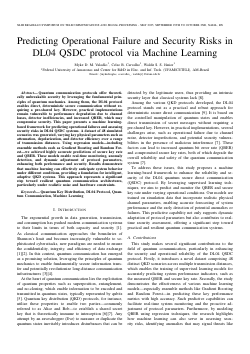
Predicting Operational Failure and Security Risks in DL04 QSDC protocol via Machine Learning
Myke Valadão
DOI: 10.14209/sbrt.2025.1571157268
Evento: XLIII Simpósio Brasileiro de Telecomunicações e Processamento de Sinais (SBrT2025)
Keywords: Quantum Key Distribution DL04 Protocol Quantum Communication Machine Learning
Abstract
Quantum communication protocols offer theoretically unbreakable security by leveraging the fundamental principles of quantum mechanics. Among them, the DL04 protocol enables direct, deterministic secure communication without requiring a pre-shared key. However, practical implementations remain vulnerable to performance degradation due to channel losses, detector inefficiencies, and increased QBER, which may compromise security. This paper presents a machine learning-based framework for predicting operational failures and assessing security risks in DL04 QSDC systems. A dataset of 48 simulated scenarios was generated, varying key physical parameters such as attenuation, depolarization, and detector efficiency over a range of transmission distances. Using regression models-including ensemble methods such as Gradient Boosting and Random Forest-we achieved highly accurate predictions of secure key rate and QBER. These models enable real-time monitoring, anomaly detection, and dynamic adjustment of protocol parameters, enhancing both performance and security. Results demonstrate that machine learning can effectively anticipate system behavior under different conditions, providing a foundation for intelligent, adaptive QKD systems. This approach represents a significant step toward resilient quantum communication architectures, particularly under realistic noise and hardware constraints.Download